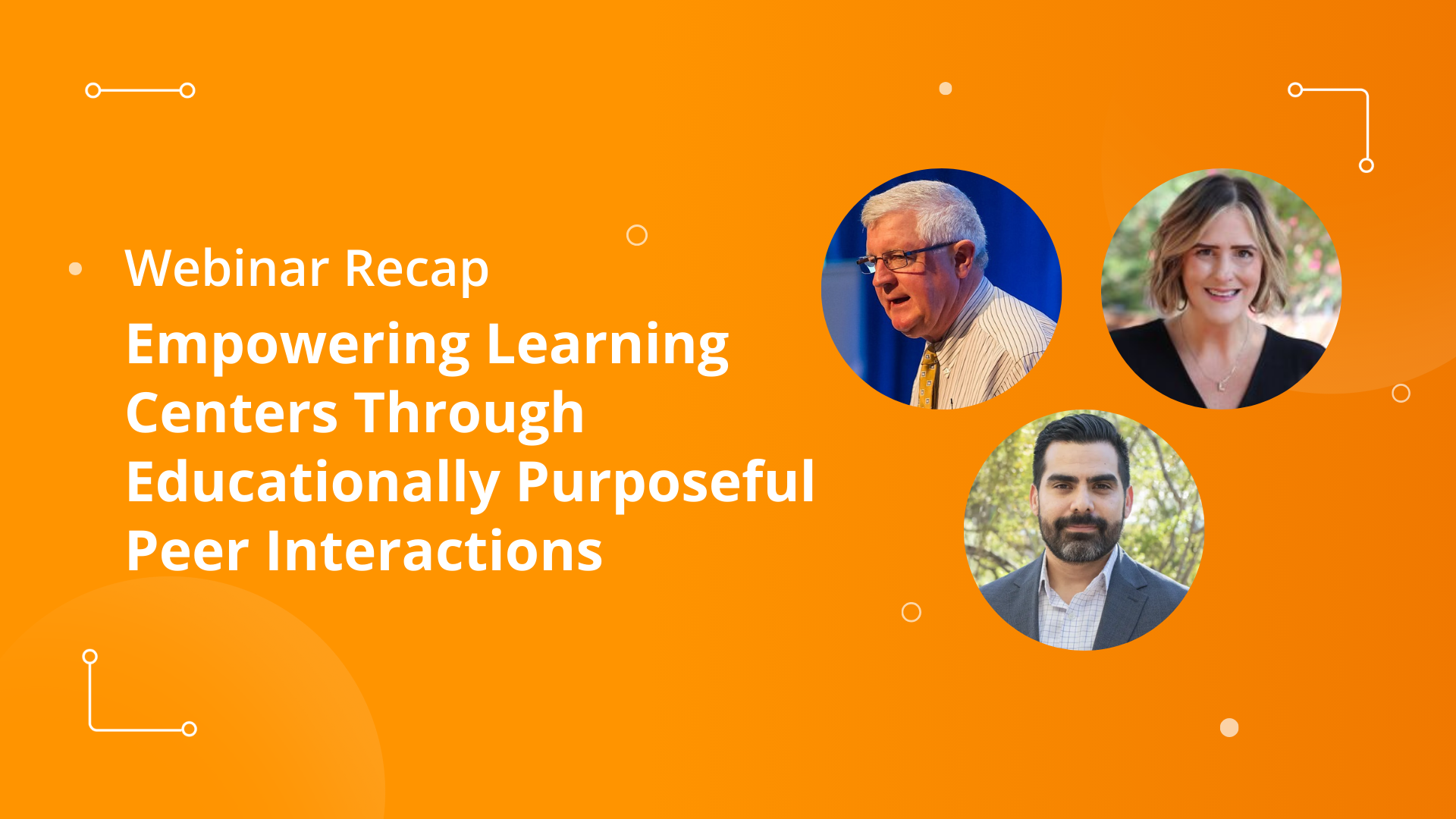In a webinar titled Empowering Learning Centers Through Educationally Purposeful Peer Interactions, experts Dr. George Kuh, Dana Talbert, and Marco Ortiz shared strategies to strengthen learning centers by harnessing the power of peer interactions, particularly through peer tutoring. Their discussion provided key insights on how institutions can leverage peer-led initiatives to promote academic success, engagement, and a sense of belonging on campus.
Harnessing Peer Influence Through Tutoring
Peers play a critical role in shaping each other’s academic experiences, often influencing engagement, motivation, and learning outcomes. Dr. George Kuh emphasized that students learn a great deal from one another, often in ways that formal instruction cannot replicate.
When implemented strategically, peer tutoring becomes a structured and impactful way to facilitate meaningful interactions that extend beyond coursework. Kuh pointed out that many institutions still underutilize peer tutoring, missing opportunities to provide students with additional learning support while fostering connections that enhance persistence and retention. Learning centers can significantly benefit from integrating peer tutoring into their offerings, ensuring that students have access to both academic assistance and peer mentors who help navigate the challenges of college life.
Cost-Effective Implementation of Peer Tutoring
One of the most common barriers to expanding peer tutoring programs is the perceived financial burden. However, Marco Ortiz, former Director of the University of Arizona’s THINK TANK and now Executive Director of the Carole and Marcus Weinstein Learning Center at the University of Richmond, argued that peer tutoring is one of the most cost-effective academic support strategies institutions can implement. Compared to professional tutoring services, peer tutoring offers a scalable and affordable way to extend academic resources to a larger student population.
Ortiz suggested that when seeking institutional support, learning centers should present data-driven evidence of the positive impact of peer tutoring on student retention, engagement, and success. This can help administrators understand the value of investing in peer-led initiatives. Additionally, Dana Talbert, Student Success Center Director at the University of South Carolina, emphasized the importance of exploring alternative funding sources, such as grants, donor contributions, and partnerships with academic departments. By demonstrating the broad benefits of peer tutoring, learning centers can secure sustainable funding and ensure program longevity.
Strategies for Recruiting and Engaging Peer Tutors
Attracting and retaining qualified peer tutors has become increasingly challenging, especially with changing employment trends and competing opportunities for student workers. To address this, learning centers must implement intentional recruitment strategies that not only attract potential tutors but also foster a strong sense of community among them.
Talbert and Ortiz recommended a multifaceted approach to recruitment, including hosting informational tables, conducting targeted email campaigns, leveraging faculty recommendations, and encouraging word-of-mouth referrals from students.
Beyond recruitment, retention is equally important. Learning centers should invest in building a supportive environment where tutors feel valued and connected. Regular team-building activities, professional development opportunities, and ongoing training sessions can help create a strong sense of community and encourage long-term commitment from tutors.
Comprehensive Training for Peer Tutors
Effective peer tutoring requires more than subject-matter expertise—it demands strong communication skills, the ability to facilitate learning, and an understanding of diverse student needs. Training plays a vital role in equipping tutors with the skills necessary to support their peers effectively.
The webinar highlighted the importance of structured training programs, such as those endorsed by the College Reading & Learning Association (CRLA) through the International Tutor Training Program Certification (ITTPC). These programs provide tutors with essential pedagogical strategies, active listening techniques, and approaches to fostering an inclusive learning environment. Additionally, continuous professional development ensures that tutors remain engaged and evolve in their roles, leading to better support for students who rely on their guidance.
Integrating Artificial Intelligence in Tutoring
The rise of artificial intelligence (AI) in education has introduced new possibilities for enhancing tutoring programs. While AI cannot replace the value of human interaction, it can serve as a powerful tool to complement peer tutoring efforts.
Talbert discussed how AI-driven platforms can assist tutors by:
- Offering alternative explanations and adaptive feedback tailored to student needs.
- Providing real-time grammar and writing suggestions to streamline tutoring sessions.
- Identifying learning gaps and recommending personalized resources for students.
However, it is crucial to strike a balance between leveraging technology and maintaining the personal connection that peer tutoring fosters. AI should be used as a supplement, helping to increase efficiency and accessibility while ensuring that human interactions remain at the heart of the learning experience.
By implementing these strategies, learning centers can create robust, well-structured peer tutoring programs that extend academic support while fostering meaningful connections among students. As institutions continue to explore ways to enhance student success, investing in educationally purposeful peer interactions remains a powerful and cost-effective approach to strengthening learning communities and improving outcomes for all students.
To learn more about how Knack can support your institution in scaling peer tutoring and fostering student success, visit joinknack.com.
